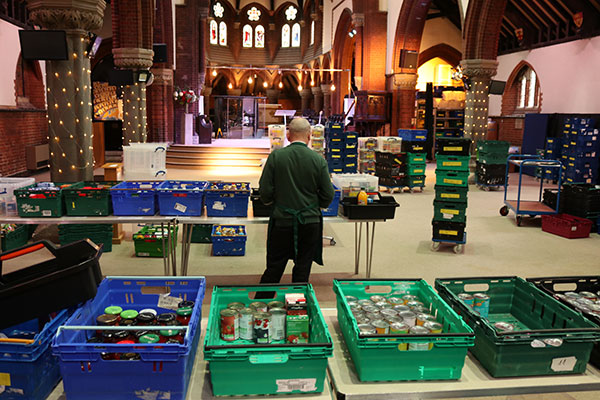This Christmas, tens of thousands of people in the UK will walk through the doors of a food bank.
“People have told me they don’t know what they would’ve done if we hadn’t been there, that we saved their life because they saw no other way out,” says Dan Frith, the manager at Wandsworth Food Bank, one of around 2,000 that will be handing out emergency food this festive season.
“People have said that the only other option they could think of, after having exhausted all available family, friends and savings, would be to have shoplifted or stolen bread to eat so they could feed their kids. It’s extreme the levels of deprivation we’re seeing.”
Last December, according to the Trussell Trust, which oversees the largest network of food banks in the UK, 186,185 emergency food parcels were handed out, nearly 80,000 of which went to children. That’s 44 per cent higher than the monthly average for the rest of the year.

For Dan and his team at Wandsworth, which is made up three other staff members and 230 volunteers, both demand and donations tend to double over Christmas putting additional strain on their small shared storage space. “It’s the first month where the weather turns significantly colder,” he adds. “For people on very low incomes, typically they’d be using prepayment meters so if they want to keep their property warm it’s an extra cost. It’s also the school holidays, which means an extra two weeks where kids who would’ve been getting a free school meal won’t.”
“There are also continuing issues, such as benefits, illness and disability, which are compounded in colder weather in many cases, making it worse for people,” adds James Quayle, the manager at North Paddington Food Bank. But though Christmas is an “extremely busy” time, the demand “doesn’t necessarily go down from that spike,” he adds. “It’s always just rising and rising.”
In fact, over the last five years the number of emergency food parcels provided to people by Trussell Trust food banks increased by 73 per cent. The average income for people referred to the service is just £50 per week after they’ve paid their rent, with 94 per cent unable to afford the basic essentials they need to remain warm, clean and fed.

At Truro Food Bank in Cornwall, 50 per cent of those that turn to the service work but still find themselves unable to make ends meet. These are postal workers, taxi drivers, student nurses and teaching assistants, manager Simon Fann tells me, whose wages are simply too low to survive on. “The taxi driver for example is a single parent with a huge family and she can only drive part-time.”
The only way the rural food bank can cope with the rising demand is thanks to regular weekly donations being topped up with special one-off events, such as the harvest festival, he explains: “Without those, demand would outstrip supplies very, very quickly.”
Yet two decades ago, food banks in the UK were virtually unheard of. In fact, in three months’ time the Trussell Trust will mark the 20-year anniversary of its first centre in Salisbury. Now it has around 1,200 in its network, alongside the approximately 800 that are run on an independent basis.
We shouldn’t allow food banks to become a long-term solution to food poverty at Christmas or any other time, urges Frith, back in Wandsworth. “No charity can replace the dignity of having enough income to be able to go to a shop and buy your own food. We try to make the process as dignified as we can but we’re acutely aware that food banks aren’t a solution to the problem, and no charity really is. It’s a tragedy that anyone should have to use a food bank.”
It’s for that reason that campaigners are calling for government to give everyone in the UK a so-called ‘right to food’, protected under the law.

Though successive governments have signed international treaties that commit to this as a human right, they’re yet to incorporate it into a UK law that people can rely on, explains Imogen Richmond-Bishop, right to food coordinator at Sustain, who are calling for the change along with a number of other organisations.
“The UK is a very, very wealthy country and it’s just unacceptable that millions of our citizens are going hungry,” she adds. “We need to put resources into stopping that. It’s not due to a lack of food – there’s so much that is wasted – it’s due to wages being too low, welfare payments being too low and living costs being too high. These are all things that can be prevented.”
Were a right to food adopted as law, any government would have to ensure any and all policies don’t threaten that human right, be it changes to benefits or wages, or anything else.
Labour’s recent manifesto included a right to food as a policy, but since the party’s landslide defeat the future of the concept is uncertain.
“Every supermarket now will have a steel crate where you can put donations to a food bank,” Richmond-Bishop goes on. “A few decades ago, that just wasn’t the case. Not to put down the great work that thousands of people around the country are doing but realistically they shouldn’t have to. It’s not a solution to hunger. If you speak to food banks all around the country, they’re all at capacity, they just don’t see a way out.”
Food for thought for all of us this Christmas.










0 Comments